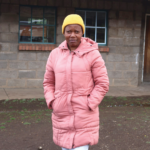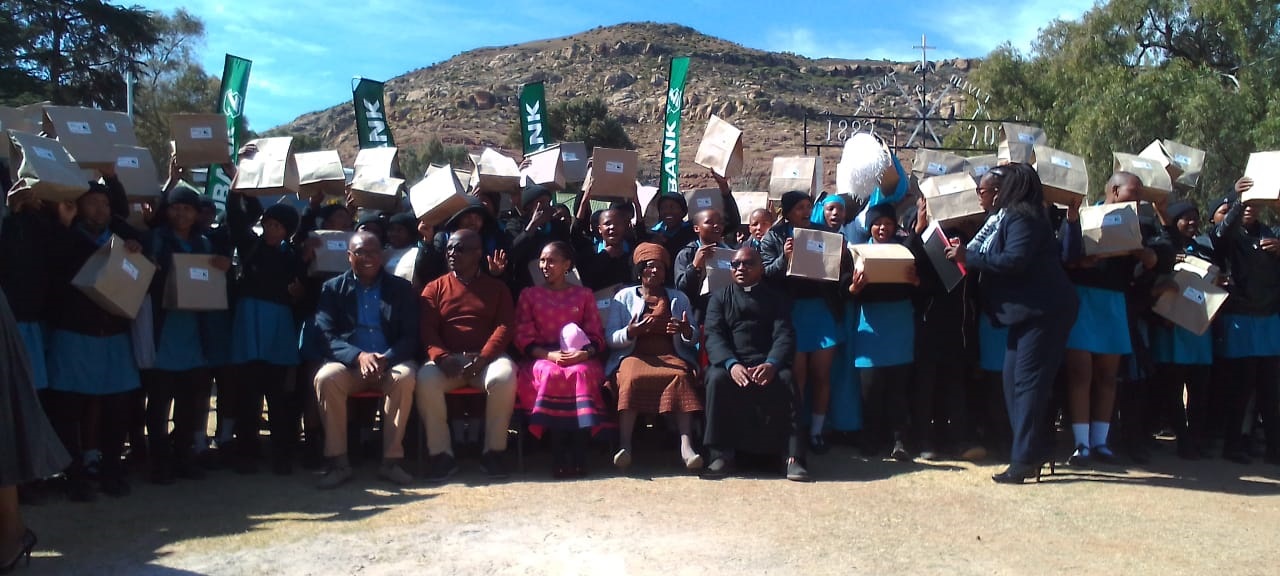LM
UNICEF restores the dignity of young girls in Ribaneng
…as Lesotho celebrates the International Day of the Girl Child
Ntsoaki Motaung
In celebrating the International Day of the Girl Child, the United Nations International Children’s Emergency Fund (UNICEF) together with Queen’s National Trust Fund through the “Hlokomela Banana†initiative distributed dignity kits to girls in Ribaneng High School in Mafeteng.
The girls were provided with sanitary towels that would last them for three months until January when Hlokomela Banana returns with other kits.
The donations according to Makhamathoane Malie, Hlokomela banana coordinator would be done every three months.
Speaking at the handover ceremony, Deepak Bhaskaran, Representative of UNICEF Lesotho highlighted that the International Day of the Girl Child calls upon everyone to acknowledge the remarkable potential and abilities of girls, particularly adolescent girls in Lesotho, and their pivotal role in shaping Lesotho’s future.
He indicated that girls around the world and in Lesotho are facing a myriad of challenges which include physical and sexual violence, period poverty, gender-related vulnerabilities, inequalities and child marriage, which places them at a disadvantage.
“These challenges often disrupt girls’ education and limit their developmental opportunities,†he said, adding that child marriage and sexual violence place adolescent girls at risk of HIV infections and unwanted pregnancies, along with the potential for enduring physical and emotional suffering.
“These can perpetuate a cycle of pain with long-lasting and devastating repercussions,†Bhaskar said.
He stressed that every girl should be able to complete their education, access comprehensive health and nutrition services, and live free from gender-based violence and harmful practices including child marriage.
“We are already witnessing many girls championing solutions and change in their communities. We envision a world where girls are being given a space to shape government policy and spending, to inform the rules and norms by which businesses should operate and to direct the priorities of new research and innovations – these examples should not be novelties, but the norm,†he said.
Her Majesty Queen ‘Masenate Mohato Seeiso at a different celebration of International Day of the Girl Child in Rothe on Wednesday showed her heartfelt gratitude that Lesotho joined the rest of the world in celebrating a girl child.
She also shared the same feelings with Bhaskar that, to date, girls are still faced with challenges that taint their future to become contributors to the country’s economy.
Her Majesty indicated that child abuse has increased since Covid-19, underlining that girls are raped, human trafficked as well as being killed.
The Principal of Ribaneng High School, Pulane Nkaleche, when accepting the dignity kits disclosed that most of the children in her school are faced with poverty and could use any help they can get.
She indicated that most of their students are children either living in child-headed families or living with their grandparents while some are deserted by their parents who migrated to South Africa in search of jobs.
“The dignity kits will help keep our girls in school, especially at this time of the year when they are writing their examinations. No one will miss school because they do not have pads,†she said.
She said due to the high levels of poverty amongst the students, some of the teachers have committed to helping the neediest students with meals and hygiene kits.
The International Day of the Girl Child is celebrated every year on October 11 and is commemorated to promote awareness about the importance of and potential of girls as the future of society.
According to UNICEF, this year’s theme for the International Day of Girl Child is: “Invest in Girls’ Rights: Our Leadership, Our Well-beingâ€.
“The objective is to create a strategic moment that concentrates and celebrates the voices of girls while urging those in positions of official authority to enhance their financial support for girls’ rights.â€
UNFPA, the United Nations Population Fund Executive Director Dr Natalia Kanem in her statement issued on Wednesday indicated that every girl is born with boundless potential to learn and thrive, to lead, inspire, and change the world.
She said as States approach the 2030 deadline for the Sustainable Development Goals, they should redouble efforts to ensure that every adolescent girl, in all her diversity, can exercise her rights and choices, realise her fullest potential, and build the future she envisions for herself.
“We must however act faster and more boldly so that every girl, wherever she is, grows up safe in the knowledge that her body is her own and her future is hers to chart, that she can go to school, access the health care she needs, and live free from violence,†she said.
She said the benefits of ending child marriage extend beyond safeguarding health and human rights. The better educational outcomes that follow provide girls with the opportunity to obtain jobs in the formal economy and make a more productive contribution to their households.
“With an additional $35 billion in investments to reduce child marriage, including substantial funding for secondary education, around 58 million child marriages would be averted by 2030,†she said.
On behalf of Hlokomela Banana, Makhamathoane Malie indicated that the Queen’s initiative has assisted 35 schools and with the help of UNICEF they have increased the number by 12 more schools including Ribaneng High School.
She said the initiative aims to keep as many girls as possible in schools by helping them with dignity kits.
Malie said some of the girls drop out of school because they cannot afford or are unable to get sanitary towels.
She went on to plead with girls to avoid intimate relationships, especially relationships which lead to sexual activities as they may end up pregnant.
Malie promised that going forward, Hlokomela Banana with UNICEF will visit the school at least every quarter to provide sanitary towels which will last the girls at least three months and have them not worried about having to skip lessons.
…While empowering girls in coding…
UNICEF in partnership with Vodacom Lesotho Foundation and the Ministry of Education and Training has trained over 3000 girls in coding to advance their ability to be versatile in the digital space.
The selected girls underwent a series of Code-like-a–girl training programme through CAMARA Lesotho from December 2022 until October 2023.
#CodeLikeAGirl is a (5) five-day training workshop geared towards bridging the gender gap in Science, Technology, Engineering, and Mathematics (STEM) careers.
The program according to the two organisations was offered to girls aged 14-18 in high school level
“It provides basic knowledge of computer languages and development programs, including HTML, CSS, GitHub, and Bootstrap, enabling students to develop a website by the end of the one-week course,†Vodacom’ Tšepo Ntaopane explained.
“As Vodacom, we aim to address the underrepresentation of women and girls in STEM education and jobs. As a result, we have expanded the Code-Like-A-Girl initiative and will be closely monitoring its impact on these girls,” Ntaopane, the Executive Head of Regulatory and External Affairs with Vodacom said.
Vodacom Lesotho Foundation launched the Code-Like-A-Girl programme in 2017 and has reached more than 2364 girls in Lesotho. The programme aims to tackle the low representation of girls in STEM education, get more girls into careers requiring coding skills, or help them get a start as STEM entrepreneurs. 
For UNICEF, Deepak Bhaskaran, UNICEF’s Representative remarked, “Through the Coding training, we are introducing adolescent girls to problem-solving by teaching them to code. We aim to foster their creativity and design abilities, preparing them for a transition to work.â€
In November 2022, Vodacom Lesotho Foundation and UNICEF Lesotho entered into a strategic country level long-term partnership to expand their support to Basotho children and youth, especially the most vulnerable.
By working together, the partners aim to drive transformational change for children and adolescents and collectively deliver results in support of child rights and the Sustainable Development Goals. (SDGs)
Summary
- Speaking at the handover ceremony, Deepak Bhaskaran, Representative of UNICEF Lesotho highlighted that the International Day of the Girl Child calls upon everyone to acknowledge the remarkable potential and abilities of girls, particularly adolescent girls in Lesotho, and their pivotal role in shaping Lesotho’s future.
- Her Majesty Queen ‘Masenate Mohato Seeiso at a different celebration of International Day of the Girl Child in Rothe on Wednesday showed her heartfelt gratitude that Lesotho joined the rest of the world in celebrating a girl child.
- The International Day of the Girl Child is celebrated every year on October 11 and is commemorated to promote awareness about the importance of and potential of girls as the future of society.

Your Trusted Source for News and Insights in Lesotho!
At Newsday Media, we are passionate about delivering accurate, timely, and engaging news and multimedia content to our diverse audience. Founded with the vision of revolutionizing the media landscape in Lesotho, we have grown into a leading hybrid media company that blends traditional journalism with innovative digital platforms.







